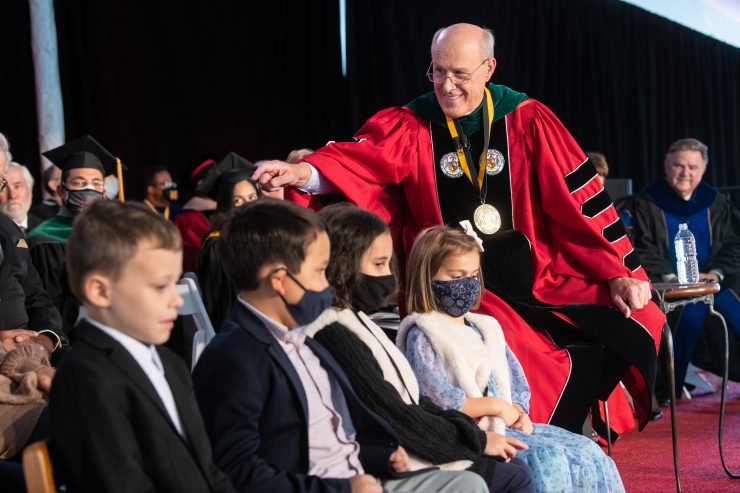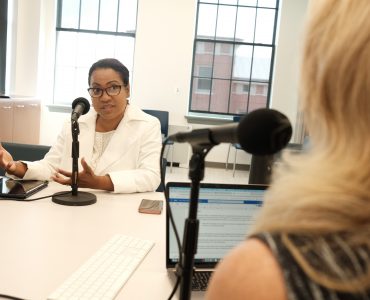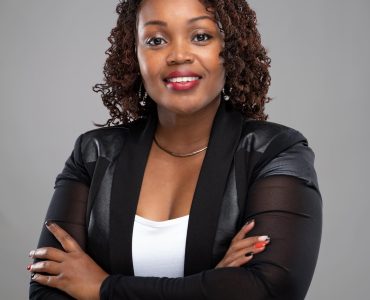Bruce E. Jarrell, MD, FACS, was installed as the seventh University of Maryland, Baltimore (UMB) president on Nov. 5 before about 400 invited guests in an outdoor ceremony. Below are five memorable moments from the inauguration.
1. University of Maryland Medical System President and CEO Mohan Suntha, MD, MBA, talks about his mentor.
Suntha spoke about meeting Jarrell when Jarrell was a professor of surgery at Jefferson Medical College in Philadelphia and Suntha a third-year medical student completing his rotation in general surgery in 1988.
“Fast-forward three decades, and I think about Dr. Jarrell and the unbelievable opportunity that I have had to consider him first a professor and teacher, now a mentor, a friend, and a professional colleague. And I would say that today represents for me a day that I am incredibly humbled and grateful to have a partner like Dr. Jarrell,” he said.
He went on to use the words grace and humility to describe Jarrell. “Those two words define his leadership style and the impact that it affords him when taking on some dramatic challenges as we have partnered together, and you don’t need to look any further than the challenges of COVID. I believe that together we have demonstrated to many external stakeholders the impact that this partnership can have.”
2. University System of Maryland (USM) Board of Regents Chair Linda R. Gooden, MBA, formally installs Jarrell as UMB’s seventh president, and USM Chancellor Jay A. Perman, MD, reads his charge of office.
As Gooden, who called Jarrell the ideal leader for UMB, bestowed him with the University’s medallion, she said, “This medallion represents the University’s traditions. Wearing it signifies your commitment to this institution, and its weight serves as a reminder of the heavy responsibilities you must carry.”
Perman, former UMB president, praised Jarrell’s leadership during the COVID-19 pandemic.
“It was probably serendipity — maybe fate, grace — that brought Dr. Jarrell to the UMB presidency at the time we all needed him the most,” Perman said. “His leadership throughout this pandemic, this University’s leadership has pulled us through one of the most difficult times in our history. The research emerging from UMB and the clinical care many of you have provided have changed the arc of this disease. Your contributions to our body of knowledge have literally saved millions of lives around the world. You’ve saved families, you’ve saved entire communities. And I promise you that your collective leadership, your hard work, will not be forgotten.”
Perman added before reading the charge of office, “And even though I acknowledge the reach and power of your excellence, I have the audacity, the hutzpah to ask for still more.”
3. Jarrell opens speech describing what he learned from his first patient.
Jarrell, a surgeon, began his speech by talking about his first patient when he was a medical student, a woman named Ruby in her 60s who had diabetes and failing kidneys. “Today, we would have put her on dialysis, maybe considered her for a transplant. Back then, dialysis was a rare resource,” he said. He said Ruby went before a medical committee but was not chosen for dialysis. “She had no hope,” he said. “She didn’t have any options. But that’s where we came in.”
Jarrell went on to describe working with his mentor, the late Norman Lasker, MD, to develop a prototype machine called the Cycler. They were able to use the machine to give Ruby dialysis.
“There were many nights that I spent in the ICU with Ruby all night, making sure that she was OK, that the Cycler was working, that we were accomplishing what we wanted to do,” he said. “And there came a time when it worked fine, and it was time to go home.”
He said every week he and Lasker would drive to Ruby’s home in South Philadelphia to bring her supplies and examine her.
“We formed a bond. What did Ruby appreciate the most with all this newfound time? She appreciated that she got to spend several more years with her grandchildren, to see her grandchildren grow a little bit more, to see them mature, to see their careers develop. That was so important to her,” he said.
He said he learned a lot from Ruby. “I learned respect for life and human dignity. I learned what a health disparity is,” he said. “I also learned in that process that I could make a difference. I’d already made a difference for one person, but maybe I could make a difference for more than one person.”
Jarrell added that a month ago he was talking to his daughter, a nurse, about one of her patients who was on dialysis. It turns out that the patient was using the Cycler.
“It was a thrill that our idea was still alive now, many years later,” Jarrell said. “It was also a thrill because our invention, our Cycler, was still helping people to survive.”
4. Jarrell invites his grandchildren up on stage.
Jarrell’s six grandchildren were in attendance, and he called them onto the stage at the end of his speech.
“I don’t just see my grandchildren. I see your grandchildren. I see grandchildren in West Baltimore. I see grandchildren on the Eastern Shore of Maryland,” he said. “I wonder, What will their future be 50 years from now? I can’t answer that question. But I can ask the question of what can we do today? One answer comes from what we’re already doing,” as he discussed the work being done at UMB such as the School of Social Work’s B’more Healthy Babies initiative that has lowered infant mortality in Upton/Druid Heights.
“Programs at UMB have made a big impact today. That will continue for the future.”
5. Jarrell’s lifelong friend makes gift to UMB.
Jarrell announced that his lifelong friend, Lawrence Hayman, whom he grew up with on Maryland’s Eastern Shore, has made a gift of nearly $18 million to UMB to support several presidential initiatives. Hayman is chairman of H&M Bay, Inc., a logistics and storage company.
“We shared common interests” when he and Hayman were growing up, Jarrell said. “But neither of us ever thought for one minute that we would be standing together like this decades later on this stage. And it’s because we share another common interest: the health and well-being of the community we grew up in.”
The gift will be used to not only fund cancer research but also provide scholarships for students on the Eastern Shore who want to attend UMB as well as incentives for care providers to set up practice on the Eastern Shore.
“That is a wonderful gift. That’s a commitment to UMB. That’s a commitment to Maryland,” Jarrell said.




